Audi Q2 VS Dacia Spring
Audi Q2
The Audi Q2 captures attention with its bold and distinctive design, combining compact dimensions with a sporty silhouette. Inside, the cabin boasts high-quality materials and a modern infotainment system, ensuring a comfortable driving experience. With its agile handling and efficient performance, the Q2 is a perfect urban companion for those seeking both style and functionality.
more informationDacia Spring
The Dacia Spring stands out as an affordable and environmentally friendly option in the electric vehicle market, combining practicality with a compact design ideal for urban settings. Its minimalist interior, while basic, provides all the essential features needed for a comfortable drive, reflecting its cost-effective approach. The vehicle's performance suits city driving, making it an appealing choice for those seeking an entry-level electric car.
more information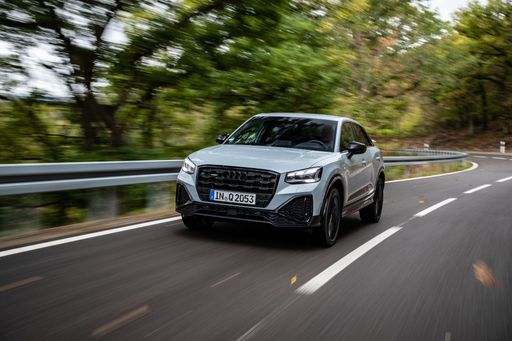 @ audi-mediacenter.com
@ audi-mediacenter.com
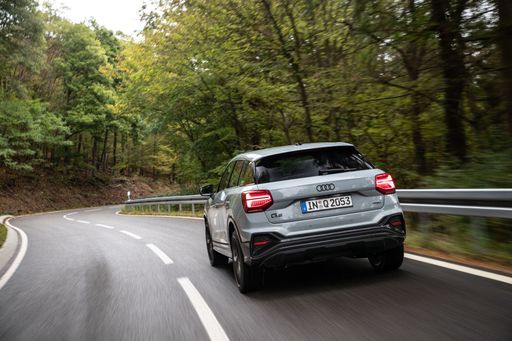 @ audi-mediacenter.com
@ audi-mediacenter.com
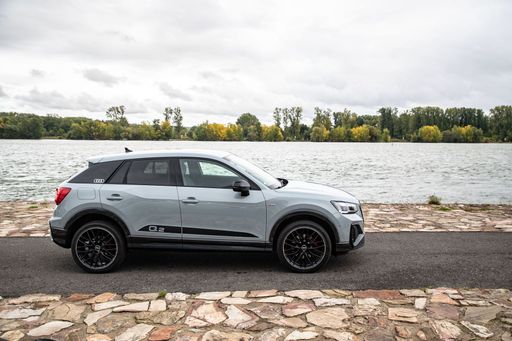 @ audi-mediacenter.com
@ audi-mediacenter.com
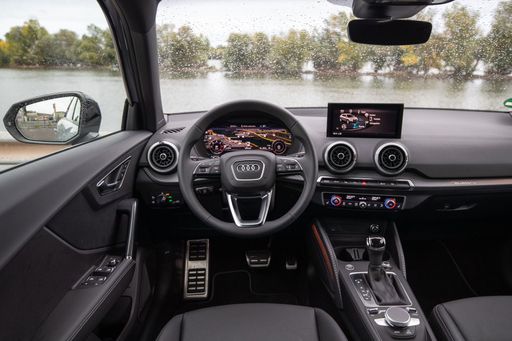 @ audi-mediacenter.com
@ audi-mediacenter.com
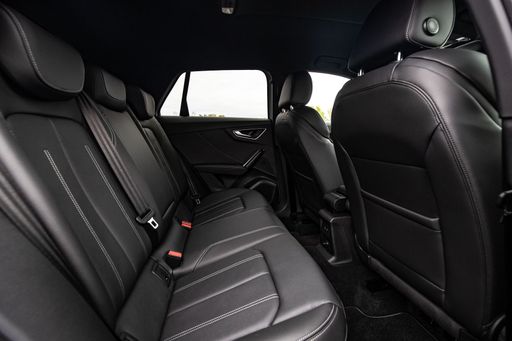 @ audi-mediacenter.com
@ audi-mediacenter.com
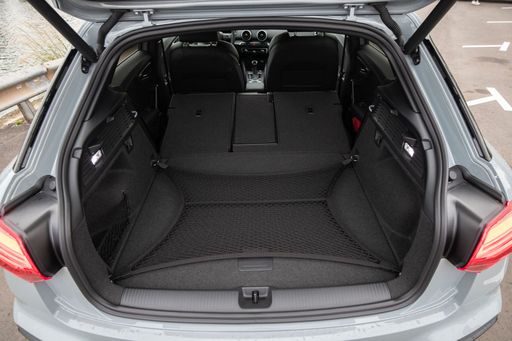 @ audi-mediacenter.com
@ audi-mediacenter.com
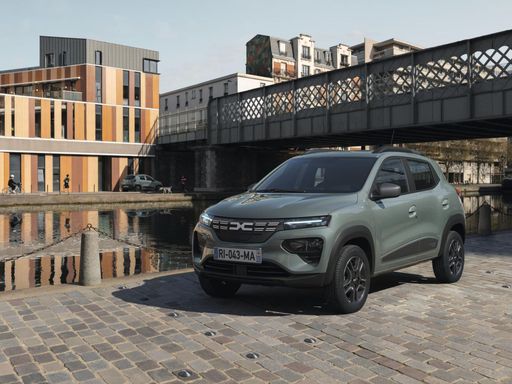 @ dacia-presse.de
@ dacia-presse.de
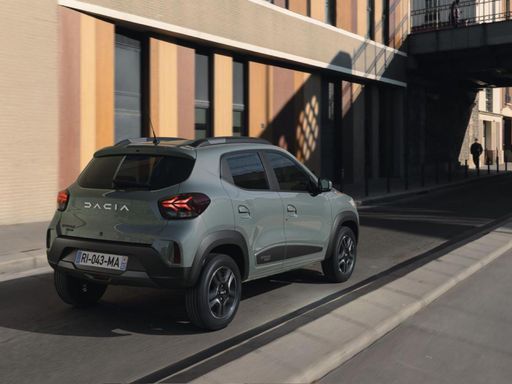 @ dacia-presse.de
@ dacia-presse.de
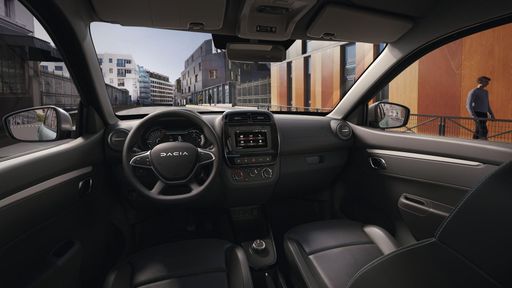 @ dacia-presse.de
@ dacia-presse.de
Costs and Consumption |
|
|---|---|
|
Price
about 26400 - 46700
$
|
Price
about 15600 - 18400
$
|
|
Consumption L/100km
5.1 - 8.4
L
|
Consumption L/100km
-
|
|
Consumption kWh/100km
-
|
Consumption kWh/100km
13.2 - 14.1
kWh
|
|
Electric Range
-
|
Electric Range
225 - 228
km
|
|
Battery Capacity
-
|
Battery Capacity
26.8
kWh
|
|
co2
130 - 190
g/km
|
co2
0
g/km
|
|
Fuel tank capacity
50 - 55
L
|
Fuel tank capacity
-
|
Dimensions and Body |
|
|
Body Type
SUV
|
Body Type
SUV
|
|
Seats
5
|
Seats
4
|
|
Doors
5
|
Doors
5
|
|
Curb weight
1330 - 1610
kg
|
Curb weight
1030 - 1050
kg
|
|
Trunk capacity
355 - 405
L
|
Trunk capacity
308
L
|
|
Length
4208 - 4216
mm
|
Length
3701
mm
|
|
Width
1794 - 1802
mm
|
Width
1583
mm
|
|
Height
1495 - 1508
mm
|
Height
1519
mm
|
|
Payload
450 - 510
kg
|
Payload
265 - 285
kg
|
Engine and Performance |
|
|
Engine Type
Petrol, Diesel
|
Engine Type
Electric
|
|
Transmission
Manuel, Automatic
|
Transmission
Automatic
|
|
Transmission Detail
Manual Gearbox, Automat. Schaltgetriebe (Doppelkupplung)
|
Transmission Detail
Reduction Gearbox
|
|
Drive Type
Front-Wheel Drive, All-Wheel Drive
|
Drive Type
Front-Wheel Drive
|
|
Power HP
116 - 300
HP
|
Power HP
44 - 65
HP
|
|
Acceleration 0-100km/h
4.9 - 10.5
s
|
Acceleration 0-100km/h
13.7 - 19.1
s
|
|
Max Speed
197 - 250
km/h
|
Max Speed
125
km/h
|
|
Torque
200 - 400
Nm
|
Torque
113 - 125
Nm
|
|
Number of Cylinders
3 - 4
|
Number of Cylinders
-
|
|
Power kW
85 - 221
kW
|
Power kW
33 - 48
kW
|
|
Engine capacity
999 - 1984
cm3
|
Engine capacity
-
|
|
Top speed
197 - 250
km/h
|
Top speed
125
km/h
|
General |
|
|
Model Year
2024
|
Model Year
2024
|
|
CO2 Efficiency Class
D, E, F, G
|
CO2 Efficiency Class
A
|
|
Brand
Audi
|
Brand
Dacia
|
Audi Q2
The Audi Q2 demonstrates a perfect blend of compact dimensions and luxury features, making it a prominent choice in the competitive SUV segment. With an attractive exterior design, high-quality interiors, and cutting-edge technology, it stands out as a versatile vehicle for urban commuters and weekend adventurers alike.
Striking Design and Practicality
The Q2’s design is a clear reflection of Audi's sophisticated aesthetics. Its bold stance is accentuated by angular lines and a distinctive Singleframe grille. Measuring between 4208 mm and 4216 mm in length, it remains compact yet offers ample interior space for passengers and cargo alike. The rear boasts a hatchback design, contributing to a practical trunk capacity of 355 to 405 litres, perfectly suited for everyday tasks.
Engine Options and Performance
Audi caters to diverse customer preferences by offering a range of engine choices, from efficient petrol units to powerful diesels. Engine power ranges from 116 to 300 PS, ensuring lively performance, while the 0-100 km/h acceleration time varies between 4.9 and 10.5 seconds, depending on the variant. The model year 2024 continues to impress with its harmonic balance of performance and economy, with fuel consumption figures ranging from 5.1 to 8.4 L/100 km.
Advanced Transmission and Drive Technologies
The Q2 is available with both manual and automatic transmissions, including Audi’s sophisticated S tronic dual-clutch system. Front-wheel drive and all-wheel drive options offer flexibility for different driving conditions, ensuring exceptional grip and stability on the road. With available torque figures from 200 to 400 Nm, the Q2 responds adeptly to driver commands, providing a dynamic driving experience.
Cutting-Edge Technology and Interior Features
Inside the Q2, the focus on quality is evident, with premium materials and clean lines that create a refined atmosphere. The multimedia interface features the latest in connectivity, including smartphone integration and a user-friendly interface. Optional upgrades such as the Virtual Cockpit and advanced driver assistance systems further enhance both comfort and safety, ensuring a worry-free driving experience.
Efficiency and Eco-Friendliness
Environmental considerations are integrated into the Audi Q2’s design, with CO2 emissions ranging from 130 to 190 g/km, depending on the chosen engine. The Q2 is available in several equipment lines such as ‘advanced’ and ‘S line’, allowing buyers to personalise their vehicle while taking advantage of the brand's commitment to sustainability. Fuel efficiency is balanced without compromising performance, confirming Audi's dedication to eco-friendly driving.
Conclusion: The Ideal Compact SUV
In summary, the Audi Q2 successfully embodies the perfect compact SUV, making it suitable for a variety of lifestyles. Its combination of distinctive design, flexible performance options, cutting-edge technology, and emphasis on efficiency make it a compelling choice for those seeking a premium vehicle that stands out on the roads and in the city.
Dacia Spring
The Revolution of Affordable Electric Mobility: The Dacia Spring
The automotive world has witnessed remarkable advancements in electric vehicles (EVs), with the Dacia Spring emerging as a noteworthy contender in the affordable segment. Combining efficiency, affordability, and practicality, the Spring offers an intriguing prospect for eco-conscious individuals and city dwellers alike.
Powertrain and Performance: A Look Under the Hood
The Dacia Spring is equipped with an electric motor that delivers between 44 to 65 PS, translating into a versatile driving experience tailored to urban landscapes. It operates on a front-wheel-drive system, ensuring a familiar and manageable handling experience.
Dacia Spring's electric engine is paired with an automatic transmission, utilising a reduction gearbox. This setup allows for smooth acceleration and a top speed of 125 km/h, ensuring that everyday driving scenarios are handled with ease.
Efficiency and Range: Eco-Friendly without Compromise
Efficiency is a cornerstone of the Dacia Spring's design, boasting an energy consumption of just 13.2 to 14.1 kWh per 100 km. When fully charged, its 26.8 kWh battery offers a respectable range of 225 to 228 km, making it ideal for daily commutes and short trips.
Furthermore, the Spring takes pride in its commendable CO2-efficiency class A, emphasising its commitment to reducing environmental footprint with a zero-emission profile.
Design and Practicality: Compact yet Comprehensive
Lying in the SUV category, the Dacia Spring is compact with dimensions of 3701 mm in length and 1583 mm in width, making it a perfect match for urban environments where space is at a premium. Despite its modest size, it provides a generous boot space of 308 litres, ensuring practicality isn’t sacrificed.
Comfort and Interior: For the Everyday Journey
The Dacia Spring comfortably seats up to four passengers. The cabin offers a minimalist yet functional design, available in multiple trim lines including Essential, Expression, and Extreme, allowing customers to choose according to their taste and requirement.
With its ergonomic layout and simplicity, the interior is crafted to enhance the driving experience by focusing on essential needs, avoiding unnecessary distractions.
Affordability and Accessibility: Breaking Barrier
The Dacia Spring stands out in the electric vehicle market due to its affordability, with prices ranging from 16,900 to 19,900 €. This ensures that environmentally friendly transportation is accessible to a broader audience.
Additionally, the Spring allows for cost-effective maintenance and operational expenses, offering monthly running costs between 570 to 599 € and cost per km between 22.8 to 24 cents, making it an economical choice in the long run.
Final Thoughts: The Future of Urban Mobility
In summary, the Dacia Spring serves as a testament to how electric vehicles can be both affordable and practical, without compromising on essential features. Whether it is for the eco-conscious urbanite or those looking for a cost-effective daily driver, the Spring is positioned as a viable solution for navigating the future of urban mobility.
